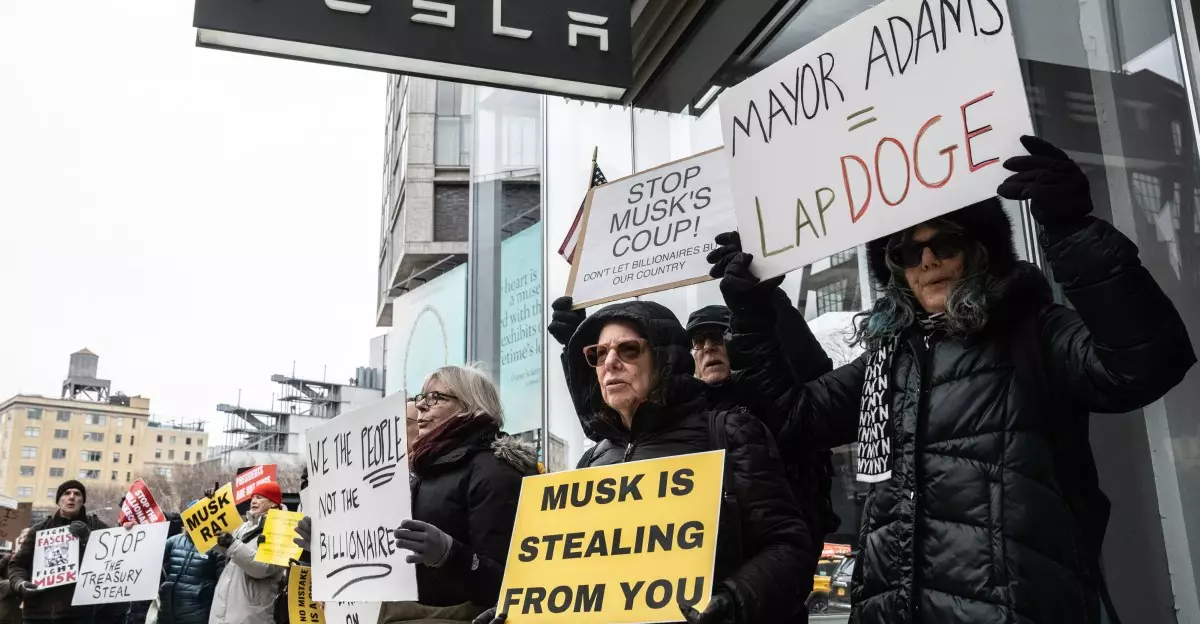The streets around Tesla showrooms across the United States have become litmus tests for public sentiment regarding the controversial leadership of CEO Elon Musk. This past weekend witnessed a series of protests focused not only on the corporation’s direction but also on a broader context of political affiliations and public ethics. With a trending hashtag, “#TeslaTakeover,” gaining traction on social media platforms, dissatisfaction among constituents and employees alike is manifesting visibly in cities from New York to less prominent areas like Golden Valley, Minnesota.
The protests are largely fueled by allegations regarding Musk’s connections with far-right political groups and his controversial role as the head of the Department of Government Efficiency during the Trump administration. Such ties have caused a wedge in public opinion, drawing a significant number of protestors who criticize Musk for what they perceive as unethical affiliations. The implications of these associations extend into the business realm, as Tesla investors express wariness about the long-term effects of Musk’s political endeavors on the company’s reputation and market performance.
Since President Trump took office, Tesla’s stock value has seen a dramatic decline of 21%. This downturn has led to frustrations within the investor community, amplifying calls for Musk to resign from his multifaceted roles at Tesla. Recent reports indicate that a faction of the company’s employees has openly suggested that the organization would benefit from a change in leadership, a sentiment underscored in a meeting highlighted by The Washington Post.
Despite being numerous, the protests lack significant turnout in most locations. A rally in Manhattan, one of the more notable demonstrations, featured chants such as “Don’t buy swasticars” as well as incendiary remarks linking Musk to extremist sentiments. The visual representation of dissent extended beyond Manhattan, with organized gatherings in cities like Austin, Seattle, and Boston. However, in several instances, participation appeared minimal, with reports of solitary figures brandishing protest signs in cities like Baltimore and Pittsburgh.
The diversity in the protest locations underscores a widespread frustration that is not limited to metropolitan areas. Demonstrations are expected to continue, particularly as activists organize additional events during holidays and weekends, ensuring that the attention on Musk and Tesla remains persistent.
High-profile individuals have taken to social media to express their discontent and encourage public action. Actor and activist Alex Winter has emerged as a prominent figure, promoting the protests and calling for collective action against Tesla’s controversial leadership. His influence coincides with the emergence of diverse protest methods, further straying from traditional picketing. Musicians like Sheryl Crow have utilized their platforms to vocalize their stance, with Crow notably spotlighting the sale of her Tesla in a symbolic distancing from the brand.
However, while the protests appear to garner attention online – particularly on platforms like Bluesky where the hashtag “#TeslaTakeover” trends – engagement across other popular social media sites such as X, Instagram, or Threads is markedly lower, suggesting a fractured narrative on the extent of discontent among Tesla consumers.
As protests continue, the trajectory of public sentiment towards Tesla and Musk is uncertain. The ongoing demonstrations highlight a unique intersection of business ethics, political affiliations, and consumer responsibility. The expected protests during significant dates, including President’s Day, indicate that dissatisfaction is unlikely to dissipate soon.
As more organized contingents emerge, the impact on consumer behavior may amplify. It remains to be seen whether these protests will influence Tesla’s corporate strategy or Musk’s own decisions moving forward. Nevertheless, the collective angst encapsulated within these rallies offers a glimpse into an evolving dynamics of brand loyalty, corporate governance, and social conscience in the modern age.
The Tesla protests form a complex narrative of social unrest catalyzed by leadership actions and public perception. As the landscape evolves, with escalating protests and calls for greater accountability, one cannot ignore the broader implications for corporate America in how personal conduct and political entanglements influence consumer trust and financial viability.

